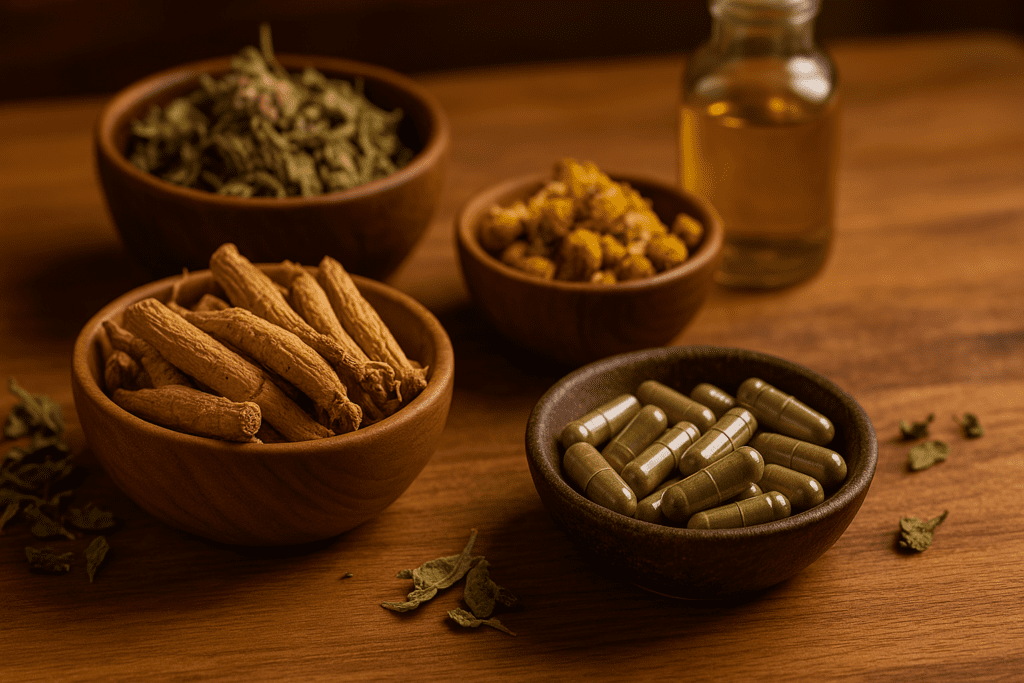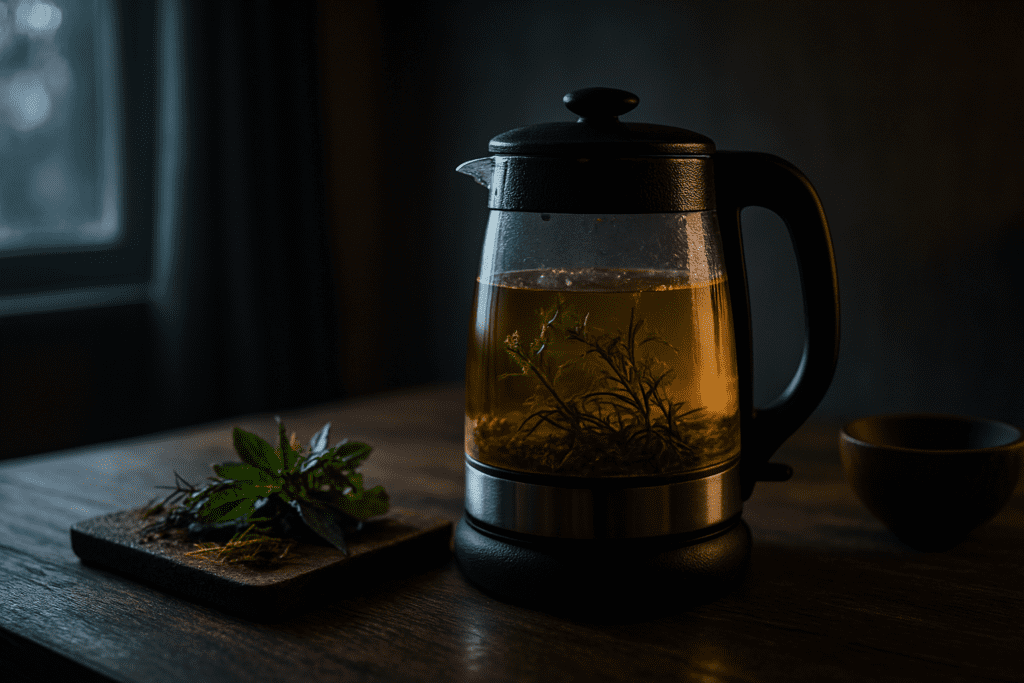In an era where the modern pace of life demands sustained mental sharpness and physical stamina, it is no surprise that many individuals seek out natural solutions to maintain their vitality. Increasingly, herbs for energy and motivation have emerged as powerful allies, offering a gentle yet effective approach to enhancing alertness, reducing fatigue, and supporting long-term wellness. These botanical tools, rooted in centuries of traditional medicine and now reinforced by emerging scientific evidence, can help bolster both cognitive function and physical drive. Whether you are a busy professional, a student, or simply someone looking to combat sluggishness and brain fog, turning to the best herbs for energy could offer a strategic and health-conscious path forward.
You may also like: Best Rated Nootropics for Brain Health: Top Supplements to Enhance Focus, Memory, and Longevity
While caffeine and synthetic stimulants have long dominated the conversation around energy, they often come with undesirable side effects like jitters, crashes, and long-term dependency. In contrast, natural herbs for energy provide a more balanced, sustainable boost that works in harmony with the body’s own biological rhythms. Herbs good for energy tend to nourish the adrenal system, support neurotransmitter function, and optimize oxygen utilization in the brain and muscles. These benefits are not only vital for daily motivation and focus but also contribute to the broader goals of cognitive longevity and anti-aging.
Let us now explore the science and tradition behind some of the best herbal supplements for energy. By understanding how each herb works in the body, we can make more informed choices about incorporating these natural remedies into our daily routines.
Rhodiola Rosea: The Arctic Root of Resilience
Rhodiola rosea, often referred to as the “golden root” or “Arctic root,” is one of the most respected energy herbs and supplements in the adaptogen family. Traditionally used in Russia and Scandinavia to enhance physical endurance and mental resilience, Rhodiola has garnered attention in modern research for its ability to reduce fatigue and improve cognitive performance, particularly under stress. Its active compounds, rosavins and salidrosides, play a critical role in modulating the stress-response system by influencing cortisol levels and supporting mitochondrial energy production.
In controlled clinical trials, Rhodiola supplementation has been linked to improved concentration, reduced mental fatigue, and faster recovery after prolonged work or physical activity. Unlike many synthetic stimulants, Rhodiola does not overstimulate the central nervous system but rather helps the body adapt to stress, making it one of the best herbs for energy and motivation without the associated crash. For individuals navigating demanding work environments or academic pressures, this herb offers a natural and sustainable cognitive lift.
Moreover, Rhodiola’s benefits extend beyond immediate energy boosts. By enhancing mitochondrial function and regulating neurotransmitters like serotonin and dopamine, it supports long-term brain health and mood balance—two critical components of lasting motivation. Its inclusion in any routine aimed at boosting vitality is not just practical but profoundly strategic from a neurobiological perspective.
Panax Ginseng: The Classic Energy Tonic of Traditional Medicine
Renowned for thousands of years in Traditional Chinese Medicine, Panax ginseng remains a cornerstone among herbs for energy. Known for its invigorating effects, this adaptogenic root has a well-documented ability to enhance physical stamina, mental acuity, and stress resilience. Ginsenosides, its primary bioactive compounds, exert a wide range of effects on the nervous system, cardiovascular function, and hormonal balance, all of which contribute to greater endurance and vitality.
Clinical studies have shown that Panax ginseng can improve reaction time, working memory, and subjective feelings of energy—especially in individuals experiencing fatigue. What sets it apart as one of the best herbal supplements for energy is its holistic effect on the hypothalamic-pituitary-adrenal (HPA) axis, allowing the body to better handle both physical and psychological stressors. To maximize its effects, Panax ginseng is often taken in cycles, allowing the body to respond adaptively.
Notably, ginseng does not offer a quick jolt of stimulation. Instead, it builds energy reserves over time, making it ideal for those seeking a long-term solution for low motivation or burnout. It also shows promise in aging populations, where it helps maintain cognitive function and vitality, aligning it perfectly with anti-aging and longevity goals. Its role as one of the most potent natural herbs for energy underscores the importance of supporting the body’s internal balance rather than relying on temporary fixes.
Ashwagandha: The Stress-Soothing Herb for Enduring Drive
Ashwagandha, also known as Withania somnifera, has surged in popularity in recent years, particularly among those interested in holistic wellness and nootropic support. A revered adaptogen in Ayurvedic medicine, Ashwagandha helps regulate the body’s response to stress by lowering cortisol and promoting a sense of calm focus. This dual action—reducing anxiety while enhancing cognitive clarity—makes it one of the best herbs for energy and motivation in our overstimulated world.
Scientific studies support its ability to improve reaction times, increase endurance, and even enhance cardiorespiratory performance. Importantly, Ashwagandha’s calming effects do not equate to sedation. Instead, it provides a clear-headed energy, making it suitable for daily use among students, professionals, and athletes alike. By promoting sleep quality and hormonal balance, it also ensures that the foundations of vitality are well supported.
For those suffering from adrenal fatigue or burnout, Ashwagandha may be particularly helpful. Its capacity to restore depleted energy reserves and enhance resilience under pressure positions it firmly among the best herbal supplements for energy. Moreover, its neuroprotective properties help safeguard long-term brain health, a key concern in the realm of cognitive enhancement and longevity.
Eleuthero: The Endurance Enhancer for Physical and Mental Performance
Often called Siberian ginseng (though unrelated botanically to Panax), Eleutherococcus senticosus is a lesser-known but potent adaptogen with a strong track record in enhancing stamina, focus, and immune resilience. Used traditionally in Russia and East Asia, Eleuthero has gained attention for its ability to increase endurance and reduce feelings of exhaustion, especially in demanding physical and mental environments.
What sets Eleuthero apart among herbs for energy is its specific effect on oxygen uptake and circulation. This makes it especially beneficial for athletes or individuals engaged in physically demanding work. However, its cognitive effects are equally noteworthy. Research indicates that Eleuthero can help reduce mental fatigue and improve working memory under stress, adding to its appeal as one of the best herbs for energy and motivation.
Its adaptogenic effects are also notable for promoting balance in the adrenal system. When used consistently, Eleuthero helps regulate energy output across the day, preventing the peaks and troughs associated with conventional stimulants. For those looking to support both body and mind through herbal supplementation, this botanical offers a multidimensional approach to vitality.

Maca Root: Hormonal Harmony for Energy and Motivation
Native to the high Andes of Peru, Maca root (Lepidium meyenii) is often celebrated for its hormone-balancing properties and energizing effects. Rich in essential amino acids, minerals, and plant sterols, Maca provides nutritional support that translates into improved endurance and mood. While not a stimulant in the traditional sense, Maca works by supporting the endocrine system, enhancing resilience to stress and promoting a sense of drive.
Maca’s benefits as one of the best herbal supplements for energy are particularly evident in studies involving individuals experiencing fatigue and low motivation. Regular supplementation has been linked to improved physical performance, enhanced mood, and better focus. It is especially useful for individuals facing energy dips associated with hormonal fluctuations, such as perimenopause or high-stress lifestyles.
Another remarkable aspect of Maca is its adaptogenic versatility. Whether taken as a powder in smoothies or in capsule form, Maca integrates seamlessly into daily wellness routines. Over time, users often report a subtle but consistent increase in stamina and a renewed sense of motivation, reinforcing its position among the best herbs for energy and motivation.
Ginkgo Biloba: Oxygenation and Alertness for Cognitive Drive
Ginkgo biloba, one of the oldest living tree species on earth, has long been valued for its ability to enhance memory and concentration. However, its role in energy production is often overlooked. By increasing cerebral blood flow and supporting mitochondrial function, Ginkgo helps deliver oxygen and nutrients to the brain more efficiently. This translates into improved mental clarity, reduced fatigue, and heightened alertness—qualities essential for sustained motivation.
In both healthy individuals and those experiencing cognitive decline, Ginkgo has shown promise in boosting executive function, working memory, and focus. It is one of the most researched herbs good for energy when it comes to cognitive performance, and its safety profile makes it a favorable choice for long-term use.
Moreover, Ginkgo’s antioxidant properties offer protection against oxidative stress—a key contributor to both aging and mental fatigue. This makes it an excellent addition to anti-aging protocols as well as everyday productivity strategies. For those who need a clear mind and consistent drive, Ginkgo biloba is a scientifically grounded option within the broader landscape of energy herbs and supplements.
Holy Basil (Tulsi): Spiritual Clarity and Sustainable Energy
Holy Basil, or Tulsi, is a sacred plant in Ayurvedic tradition, revered for its calming, purifying, and revitalizing qualities. As an adaptogen, it works by reducing stress-induced cortisol spikes while simultaneously enhancing focus and physical energy. Tulsi’s unique ability to uplift mood while calming the nervous system makes it a prime candidate among natural herbs for energy.
Modern research supports its capacity to reduce fatigue, improve mental clarity, and enhance overall vitality. It is particularly effective in balancing the autonomic nervous system, helping the body shift more easily between states of relaxation and alertness. This adaptability makes Holy Basil a uniquely supportive herb for navigating the energetic ups and downs of modern life.
Whether brewed as a tea or taken in capsule form, Holy Basil offers a gentle but profound sense of well-being and motivation. Its multifaceted impact on mood, immunity, and stamina cements its reputation as one of the best herbal supplements for energy, especially for individuals prone to burnout or emotional exhaustion.
Cordyceps: Fungal Power for ATP Production and Endurance
Cordyceps, a medicinal fungus found in the high altitudes of Tibet and China, has earned a place in the pantheon of energy herbs and supplements for its unique ability to enhance ATP (adenosine triphosphate) production—the very molecule that fuels cellular energy. Traditionally used to combat fatigue and improve respiratory health, Cordyceps now enjoys widespread use among athletes and biohackers aiming to optimize performance and stamina.
Scientific studies confirm that Cordyceps can improve oxygen utilization, increase VO2 max, and enhance exercise endurance. For those seeking natural herbs for energy that offer tangible results in physical performance, Cordyceps stands out as a top-tier choice. It works not by overstimulating but by enhancing mitochondrial efficiency, leading to sustained, jitter-free energy.
Cordyceps also exerts neuroprotective and anti-inflammatory effects, making it a valuable tool for preserving long-term cognitive health. Its inclusion in anti-aging and vitality stacks is increasingly popular, especially as more research underscores its role in promoting cellular resilience and energy metabolism. In this sense, it is more than a performance enhancer—it is a longevity ally.
Green Tea and Matcha: Sustained Stimulation with L-Theanine Synergy
Unlike coffee, which often causes spikes and crashes, green tea and matcha offer a more balanced energy experience due to the unique presence of L-theanine—a non-protein amino acid that promotes calm focus. The caffeine content in green tea is modest but sufficient to enhance alertness, and its synergy with L-theanine promotes alpha wave brain activity, which is associated with a relaxed yet attentive mental state.
This makes green tea one of the most accessible and widely consumed herbs good for energy. Matcha, a powdered form of shade-grown green tea leaves, offers a more concentrated dose of these beneficial compounds and can be particularly effective for people seeking gentle stimulation without anxiety or overstimulation.
Studies have shown that green tea extract can improve cognitive function, increase metabolic rate, and enhance fat oxidation—all of which contribute to greater physical and mental energy. It’s a prime example of how herbs for energy and motivation can offer both short-term alertness and long-term metabolic support.

Bacopa Monnieri: Memory, Learning, and Sustained Focus
Another standout from Ayurvedic medicine, Bacopa monnieri is best known for its effects on memory and learning, but its benefits extend into the domain of energy and motivation. Bacopa contains bacosides that enhance synaptic communication and reduce oxidative stress in the brain. These effects translate into improved mental energy and resilience under cognitive strain.
Unlike stimulants, Bacopa requires time to build up in the system, with most users noticing significant effects after several weeks of consistent use. Its influence on serotonin and dopamine pathways also contributes to improved mood and motivation, helping users maintain steady mental performance even during challenging periods.
Because Bacopa is both neuroprotective and adaptogenic, it offers a dual benefit—immediate cognitive enhancement and long-term support for brain aging. This makes it a strategic choice among herbs good for energy, especially when the goal is sustained intellectual output rather than short-term stimulation.
Tulsi and Ginger Combinations: Harmonizing Calm and Energy
While Tulsi (Holy Basil) has already been discussed for its adaptogenic and mood-stabilizing effects, combining it with ginger root adds another layer of vitality. Ginger contains gingerols and shogaols, which stimulate circulation, reduce inflammation, and enhance metabolic activity. When used alongside Tulsi, it creates a powerful synergy that uplifts without overwhelming the system.
This combination is especially useful in tea form, where the warmth and aroma can provide both physical invigoration and emotional soothing. It is particularly helpful during transitions in energy—such as waking up or overcoming the post-lunch slump. As a natural herb pairing, Tulsi and ginger exemplify how multiple botanicals can work together to promote balanced, sustainable energy and focus.
Frequently Asked Questions: Herbs for Energy and Motivation
1. Can herbs for energy help shift workers or those with irregular schedules?
Absolutely. People with inconsistent routines, such as shift workers or frequent travelers, often suffer from disrupted circadian rhythms and adrenal fatigue. Some of the best herbs for energy, including Rhodiola and Ashwagandha, help recalibrate the body’s stress response and restore homeostasis. Schisandra and Eleuthero are particularly effective for stabilizing energy levels across varying sleep-wake cycles. These natural herbs for energy support not only physical endurance but also mental clarity, making them ideal companions for people whose energy demands don’t follow a traditional 9-to-5 rhythm. As part of a holistic approach that includes sleep hygiene and light therapy, herbs for energy and motivation can be transformative for those navigating unconventional lifestyles.
2. How do energy herbs and supplements compare to common stimulants like caffeine or Adderall?
Unlike caffeine or prescription stimulants, energy herbs and supplements typically work by supporting the body’s underlying systems rather than simply pushing the central nervous system into overdrive. For instance, Panax ginseng and Maca improve mitochondrial function and hormonal balance over time, offering sustainable energy without crashes. This makes them fundamentally different from stimulants that deliver a quick jolt but often lead to dependency or burnout. The best herbal supplements for energy help regulate cortisol, improve oxygen utilization, and promote neurotransmitter balance—key processes that stimulate alertness without overstimulation. As a result, herbs good for energy may be a better long-term strategy for those seeking consistent motivation without side effects.
3. Are there any herbs good for energy that also help with creativity or artistic focus?
Yes, certain herbs do more than just enhance stamina—they also nourish the imaginative and intuitive faculties of the brain. Gotu Kola, for example, increases cerebral blood flow and supports the right hemisphere of the brain, which is often associated with creativity. Lion’s Mane mushroom promotes neuroplasticity, enabling more fluid thinking and novel associations—both essential for creative problem-solving. Tulsi, while calming, can foster mental clarity that artists and writers find essential for flow states. These herbs for energy and motivation don’t just stimulate the mind; they elevate the conditions necessary for creative productivity. When integrated into a daily wellness plan, they can help unlock deeper levels of mental engagement.
4. Can energy herbs and supplements support post-viral fatigue or long COVID recovery?
Emerging evidence suggests that adaptogenic herbs for energy may play a role in supporting recovery from post-viral fatigue syndromes, including long COVID. While they are not a substitute for medical treatment, herbs like Rhodiola, Ashwagandha, and Ginseng help strengthen the body’s resilience to stress and support mitochondrial repair—both of which are critical in post-viral recovery. Cordyceps, with its respiratory benefits, is especially promising for improving energy in those experiencing lingering fatigue and breathlessness. The best herbs for energy in this context focus on restoring baseline vitality rather than forcing stimulation. As always, consulting with a healthcare provider before starting herbal supplements is crucial, especially during recovery from a serious illness.
5. Are there unique benefits to combining different herbs for energy and motivation?
Combining herbs—known as herbal stacking—can yield synergistic benefits, particularly when targeting multiple aspects of energy regulation. For example, pairing Rhodiola (a stress-adaptogen) with Cordyceps (a mitochondrial enhancer) can simultaneously improve mental resilience and physical performance. Similarly, combining Tulsi for calm focus with Ginkgo for cerebral circulation can create a balanced, focused state ideal for knowledge work. The best herbal supplements for energy often use such synergistic formulas to amplify results. By selecting complementary herbs, you can address not just low energy, but also mood imbalances, poor focus, and even immune depletion. Customizing your stack with guidance from an integrative health expert can enhance both safety and efficacy.
6. Can teens or young adults safely use natural herbs for energy during exam season?
For high school and college students facing long study sessions, herbs good for energy may offer a healthy alternative to energy drinks or excessive caffeine. However, safety and age-appropriateness are key considerations. Adaptogens like Holy Basil and Gotu Kola are generally well-tolerated and can support focus and stress resilience without overstimulation. Bacopa Monnieri, traditionally used to support memory, may also benefit cognitive performance during exam periods. Still, dosage should be carefully tailored, and it’s best to consult a healthcare provider before introducing any energy herbs and supplements into a teen’s regimen. When used responsibly, the best herbs for energy can support academic performance while preserving mental well-being.
7. How long does it take to feel the effects of herbal supplements for energy?
The timeline for noticeable effects varies based on the herb, individual biochemistry, and the form of supplementation. Fast-acting herbs like Ginkgo and Peppermint may improve alertness within an hour, while adaptogens such as Ashwagandha or Maca typically require daily use over several weeks for full benefits to manifest. Natural herbs for energy often work cumulatively, nourishing adrenal, mitochondrial, and neurological systems over time. This slower onset is not a drawback but rather a reflection of their deep, systemic impact. With consistent use and proper dosing, many people find the best herbs for energy deliver lasting improvements in stamina, mood, and cognitive drive.
8. Are there any social or cultural rituals tied to herbs for energy and motivation?
Absolutely. In many cultures, herbs good for energy are central to daily rituals that foster both physical vitality and social connection. Yerba Mate, for instance, is shared communally in South America, symbolizing hospitality and intellectual engagement. Matcha ceremonies in Japan blend physical stimulation with meditative calm, creating a unique interplay of alertness and tranquility. Even Tulsi, revered in Indian households, is often consumed as part of a spiritual practice designed to energize the body while calming the mind. These practices demonstrate that energy herbs and supplements can also serve cultural and psychosocial purposes, reinforcing the connection between ritual, vitality, and community.
9. Can herbs for energy help counter the effects of digital fatigue or screen overexposure?
Digital fatigue—a modern condition linked to prolonged screen time—can significantly deplete mental energy and strain the eyes and nervous system. Fortunately, certain herbs for energy and motivation may help counteract these effects. Ginkgo Biloba enhances blood flow to the brain and eyes, potentially mitigating the cognitive and visual strain caused by excessive digital exposure. Lion’s Mane supports neuroprotection, which is crucial for brain regions involved in attention and processing speed. Tulsi and Gotu Kola can calm the overstimulated nervous system while enhancing focus, making them well-suited for those with tech-heavy lifestyles. Integrating these herbs into a daily routine can offer a plant-based buffer against digital burnout.
10. What does the future hold for the science of herbs for energy and motivation?
Research into energy herbs and supplements is rapidly evolving, with new discoveries emerging around their pharmacological mechanisms, clinical applications, and synergistic potentials. Scientists are exploring how adaptogens influence gene expression, mitochondrial biogenesis, and gut-brain axis signaling—all areas that could revolutionize how we understand natural energy enhancement. Biotechnology companies are also working on standardized, high-bioavailability extracts to ensure consistent potency and therapeutic impact. As public interest in holistic wellness grows, expect to see greater integration of the best herbal supplements for energy into functional medicine, biohacking, and even corporate wellness programs. The future promises a more precise, personalized use of natural herbs for energy—bridging ancient wisdom with cutting-edge science.

Conclusion: Choosing the Best Herbs for Energy and Motivation with Purpose and Precision
In a world that often demands more than our biological systems were designed to give, finding natural ways to support energy and motivation is not merely desirable—it is essential. From the adrenal-supportive qualities of Ashwagandha and Eleuthero to the brain-oxygenating effects of Ginkgo and Rhodiola, the best herbs for energy offer diverse, synergistic benefits that extend far beyond momentary stimulation. These herbs work not only to elevate physical stamina but also to enhance mental clarity, emotional resilience, and long-term well-being.
As science continues to validate what traditional systems of medicine have known for centuries, we are better equipped to make informed, personalized choices about the herbs good for energy in our daily lives. Whether through a morning infusion of Holy Basil, a pre-workout dose of Cordyceps, or a focused nootropic stack including Rhodiola and Ginseng, energy herbs and supplements offer a natural, sustainable path to reclaiming vitality.
The journey toward enhanced motivation and focus does not require harsh stimulants or fleeting solutions. Instead, it calls for thoughtful integration of the best herbal supplements for energy—those that honor the body’s rhythms, nourish its systems, and empower the mind. In doing so, we not only boost our present performance but also invest in the future health and longevity of our most vital asset: the brain.
natural energy boosters, herbal adaptogens, plant-based vitality, fatigue recovery herbs, cognitive enhancement herbs, herbs for mental stamina, holistic energy support, adrenal health remedies, focus and concentration herbs, brain-boosting botanicals, herbal nootropics, mood and energy balance, mitochondrial support herbs, neuroprotective plants, traditional medicine for energy, herbal endurance solutions, botanical supplements for focus, energy support for students, long-term energy solutions, herbal strategies for burnout
Further Reading:
13 Best Brain Booster Supplements and Cognitive Enhancement Pills
The 12 Best Supplements For Energy In 2025
11 Herbs That Will Help Make Your Memory, Focus And Brain Work Better Than Ever
Disclaimer
The information contained in this article is provided for general informational purposes only and is not intended to serve as medical, legal, or professional advice. While Health11News strives to present accurate, up-to-date, and reliable content, no warranty or guarantee, expressed or implied, is made regarding the completeness, accuracy, or adequacy of the information provided. Readers are strongly advised to seek the guidance of a qualified healthcare provider or other relevant professionals before acting on any information contained in this article. Health11News, its authors, editors, and contributors expressly disclaim any liability for any damages, losses, or consequences arising directly or indirectly from the use, interpretation, or reliance on any information presented herein. The views and opinions expressed in this article are those of the author(s) and do not necessarily reflect the official policies or positions of Health11News.


